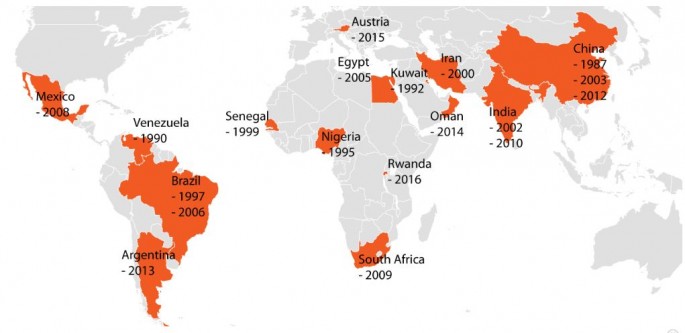The first report on biotechnology in developing countries revealing an overall picture of their biotechnology growth and competitiveness was released last week.
The report was issued during the 27th TWAS General Meeting held in Kigali, Rwanda. The meeting was organized by CAS-TWAS Centre of Excellence for Biotechnology (CoEBio), a joint center operated by the Chinese Academy of Sciences (CAS) and TWAS, or the World Academy of Sciences for the advancement of science in developing countries.
TWAS was formerly known as the Third World Academy for Sciences. It is a global science academy based in Trieste, Italy working to advance science and engineering for sustainable prosperity in the developing world.
TWAS was founded in 1983 by a distinguished group of scientists from the developing world, under the leadership of Nobel Laureate Abdus Salam, a Pakistani physicist. The founders shared a belief developing nations, by building strength in science and engineering, could build the knowledge and skill to address such challenges as hunger, disease and poverty.
Held annually, the TWAS General Meeting showcases scientific excellence in the developing world. The meetings convene a range of participants -- from the elite ranks of TWAS fellows and TWAS prize winners -- to government science ministers and presidents of universities and science academies.
The TWAS report reveals that among the 141 developing countries, 128 countries have references published in biotechnology and only 30 countries have had patents granted.
Five regions of TWAS (TWAS East and Southeast Asia and Pacific Region and TWAS Sub Saharan Africa Region) have the most references and patents, while, TWAS Sub Saharan Africa has the most active cooperation.
The report lists China, India, Brazil and Mexico as having the most references and patents. Saudi Arabia, Iran, Pakistan, Malaysia and Algeria have the fastest growth in references. China has the most references and patents among all.
The report focused on scientific publications and patents in 32 categories of industrial, agricultural and medical biotechnologies, said Release by Professor LI Yin, director of CoEBio. It covers 141 developing countries during the period 2004 to 2014, and included collaborations among those countries.
"This report is the first extensive document summarizing the development status of a specific technology area in the developing world," said Prof. Yin.
BAI Chunli, President of CAS and TWAS, said the report provides a strong, valuable assessment of biotechnology activities in developing countries, as measured in scientific publications and patents.
The report was a joint work of CoEBio and Clarivate Analytics (formerly the IP & Science business of Thomson Reuters).
It also has a comparative study of development and characteristics among five regions in TWAS, with a detailed analysis of each country. This study provides a macro-reference of the subject for TWAS and UNESCO in understanding the current status and future trends in biotechnology development in developing countries.
CoEBio was formally established in 2013, based on the Institute of Microbiology, Chinese Academy of Sciences. It is an integrative platform aimed at strengthening the biotechnology innovation capability of developing countries.
It also provides biotechnological solutions to problems in developing countries through strategic intelligence analysis, scientific cooperation, technology training and education relating to biotechnology.



























